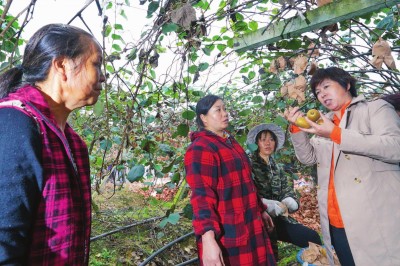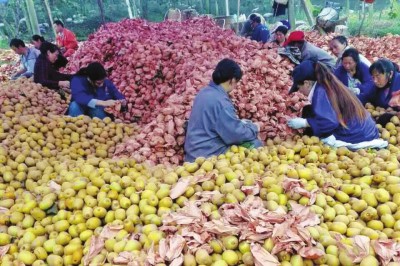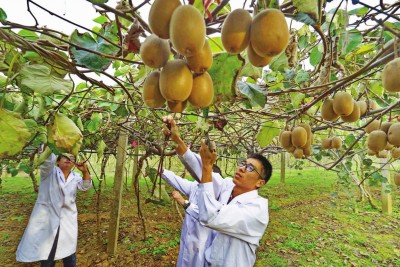How to profit from kiwifruits?
GPIG by Zhang Ling, March 8, 2017 Adjust font size:
Pujiang County is known to have some of the most fertile agriculture land in southwest China's Sichuan Province. Tangerines and paddy rice are familiar crops that thrive in this region, but how about the farms growing kiwi fruits? And how does this brown, fuzzy fruit help locals to turn a profit?

Out in the fruit-laden orchard, Dr. Zhong talks to an attentive audience. [cas.cn]
Standing among rows of plants loaded with kiwis at a national demonstration garden, Dr. Zhong Caihong of Wuhan Botanical Garden, Chinese Academy of Sciences (CAS), a top expert on kiwifruit germplasm and breeding, detailed all the advantages of growing kiwis.
"The soil is highly fertile here with lots of the organic matter that kiwis like. In addition, the weather is moderate and the humidity is high, as the county is located along the Yangzte River," said Zhong.
In contrast to raising grain crops that require planting and protection within a single growing season, kiwi plants can survive in moderate areas over many growing seasons. Moreover, each vine can produce hundreds of pounds of fruit during the harvest season, while the total fruit output increases sharply year after year, according to Dr. Zhong.
Concerted Efforts
Early in 2013, local authorities took the first initiatives to promote organic farming, while encouraging farmers to dedicate more space to organic kiwis. In 2016, around 6,667 hectares of kiwis were cultivated in this area, which produced over 70,000 tons of fruit, bringing 700 million yuan (U.S. $102 million) to organic farmers.

Pujiang County farmers harvest their organic kiwi fruits in the spring. These are being sorted for grading and packing.[cas.cn]
One of the kiwi growers, Xia Cunming, shared his story with our reporters. He had planted four hectares of different varieties of kiwis, SunGold and red-fleshed varieties. Output hit a high last year with 65 tons kiwis, offering an attractive yield for his family.
"The business of planting and processing kiwi fruits has helped my family increase our earnings. And it has greatly improved our quality of life. Now, we even own four different cars," added Xia's daughter.
"I invested heavily in the four hectares before and during planting," explained Xia. "That included rental of the land, the cost of cultivating the fields, seedlings or saplings, and labor input, which totaled 180,000 yuan (U.S. $26,125) over the first three years. But after this initial preparation, costs are expected to fall. As I (used to be a farmer) have easy access to natural farm-based fertilizers, from stock such as cattle and poultry."

A research team led by Dr. Zhong carefully monitors the growth of fruit. [cas.cn]
Zhong claimed that it typically takes anywhere from three to as many as seven years for kiwi plants to reach maturity. Because of this lengthy investment in time, farmers need to ensure they cultivate their plants using the optimal methods available, as they wait for the initial investment to pay off.